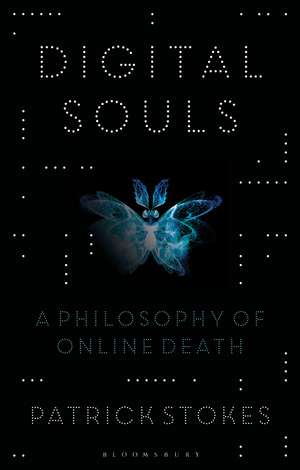Digital Souls: A Philosophy of Online Death
Autor Patrick Stokesen Limba Engleză Paperback – 10 feb 2021
| Toate formatele și edițiile | Preț | Express |
|---|---|---|
| Paperback (1) | 151.84 lei 3-5 săpt. | +24.87 lei 7-13 zile |
| Bloomsbury Publishing – 10 feb 2021 | 151.84 lei 3-5 săpt. | +24.87 lei 7-13 zile |
| Hardback (1) | 465.56 lei 6-8 săpt. | |
| Bloomsbury Publishing – 10 feb 2021 | 465.56 lei 6-8 săpt. |
Preț: 151.84 lei
Preț vechi: 165.51 lei
-8% Nou
Puncte Express: 228
Preț estimativ în valută:
29.06€ • 30.16$ • 24.23£
29.06€ • 30.16$ • 24.23£
Carte disponibilă
Livrare economică 01-15 martie
Livrare express 15-21 februarie pentru 34.86 lei
Preluare comenzi: 021 569.72.76
Specificații
ISBN-13: 9781350139152
ISBN-10: 1350139157
Pagini: 208
Dimensiuni: 138 x 216 x 18 mm
Greutate: 0.27 kg
Editura: Bloomsbury Publishing
Colecția Bloomsbury Academic
Locul publicării:London, United Kingdom
ISBN-10: 1350139157
Pagini: 208
Dimensiuni: 138 x 216 x 18 mm
Greutate: 0.27 kg
Editura: Bloomsbury Publishing
Colecția Bloomsbury Academic
Locul publicării:London, United Kingdom
Caracteristici
Author has already established a reputation in this, through his work on such projects as 'Online Interactions with the Dead', funded by Deakin University
Notă biografică
Patrick Stokes is a senior lecturer in Philosophy at Deakin University, Melbourne, Australia. He is the author of The Naked Self: Kierkegaard and Personal Identity (2015) and Kierkegaard's Mirrors: Interest, Self, and Moral Vision (2010) and his current research interests include Kierkegaard, personal identity, the philosophy of death, moral progress, the ethics of conspiracy theory and the work of K.E. Løgstrup.
Cuprins
Introduction
1. Dying Online
2. #TheWorkOfMourning
3. Kicking the Virtual Dust
4. Ghosts in the Machine
5. Deletion as Second Death
6. When the Dead Talk Back
7. "To be dead is to be a prey for the living"
Index
Recenzii
[Stokes addresses] the exploitation of dead people's memories in the form of big data, where numerous e-commerce giants work in tandem with social media platforms . Stokes leaves us here with a call to action. We must wrestle control from these corporations. We must restore dignity to the dearly departed.
Eloquently written, choc-a-bloc with piquant stories of tech history, and combined with the penetrating philosophical analysis we have come to associate with the author, Digital Souls is a rigorous and yet accessible mediation on the perennial question of personal identity as it intersects with our evolving cyber self-personifications. It is a rare feat, but there is enough history of philosophy in these pages to satisfy scholars without losing non-academic readers. In sum, the smart move would be to put away your Smartphones for an hour or three to digest this wise and entertaining reflection on how new-technologies of the self are molding our understanding of personal immortality and alas, what it means to be a self.
Digital Souls is a little gem of applied philosophy, and Stokes' erudition is undiminished by the lightness and accessibility with which he presents it. Scholars and general readers alike will have their assumptions constructively disrupted by this book, and it's certainly been a long time since I was this enjoyably provoked.
Online technologies have allowed us to extend ourselves ever further in space, time and memory. But have they thereby allowed us to 'cheat death'? Digital Souls is a seminal investigation of this possibility and the ethical quandaries it raises for all who live in a digitalized social world.
This is a fascinating exploration of how online sites and resources represent, and, in some ways, transform death. The book is written in a lively and accessible style. It helps us to understand our attitudes toward death in a new and illuminating way. Highly recommended!
Eloquently written, choc-a-bloc with piquant stories of tech history, and combined with the penetrating philosophical analysis we have come to associate with the author, Digital Souls is a rigorous and yet accessible mediation on the perennial question of personal identity as it intersects with our evolving cyber self-personifications. It is a rare feat, but there is enough history of philosophy in these pages to satisfy scholars without losing non-academic readers. In sum, the smart move would be to put away your Smartphones for an hour or three to digest this wise and entertaining reflection on how new-technologies of the self are molding our understanding of personal immortality and alas, what it means to be a self.
Digital Souls is a little gem of applied philosophy, and Stokes' erudition is undiminished by the lightness and accessibility with which he presents it. Scholars and general readers alike will have their assumptions constructively disrupted by this book, and it's certainly been a long time since I was this enjoyably provoked.
Online technologies have allowed us to extend ourselves ever further in space, time and memory. But have they thereby allowed us to 'cheat death'? Digital Souls is a seminal investigation of this possibility and the ethical quandaries it raises for all who live in a digitalized social world.
This is a fascinating exploration of how online sites and resources represent, and, in some ways, transform death. The book is written in a lively and accessible style. It helps us to understand our attitudes toward death in a new and illuminating way. Highly recommended!
